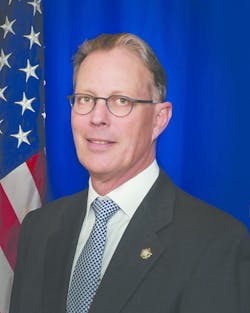10 Questions with NSA Executive Director/CEO Jonathan Thompson
The National Sheriff Association’s newest executive director, Jonathan Thompson, was recently to Arizona and Texas visiting border country in an attempt to understand the precarious situation that sheriffs in that region are up against. He brings to his post a wealth of technology and software knowledge hearkening back to his days as VP for the Software and Information Industry Association, as well as insights on disaster mitigating and response, having worked extensively with FEMA. Though he’s only been at his new post for four months, Thompson’s got plans to help deputies and sheriffs get the tools and training they need in a cost effective matter, and wants to start a new dialogue about the problem of mental illness in jails.
1) LET: You didn’t start out in law enforcement. What did your career look like in the early days, and how did it eventually parlay to NSA’s director?
Thompson: Most of my career has been focused on disaster recovery and disaster preparedness and planning. It’s actually interesting to me because throughout all of my career I’ve worked closely with not just law enforcement, but first responders and military. So it’s almost been a natural progression to bring my perspective of Washington [and] my experience in Washington—to form an understanding of how sheriffs can be a more successful advocate inside Washington.
I worked very closely helping start the Transportation Security Administration for the first eight months or so and it allowed me a very deep inside perspective as to how LE was going to try and respond to 9/11…what requirements were needed to help them be more effective. What I found, even back then, was that sheriffs were kind of the unsung heroes in a lot of ways. I think we always talk about police, which is a very valuable, important group…and sheriffs are the only ones that are elected solely for law enforcement. It really gave me a keen understanding of what kind of challenges they face in particular, and their deputies, too.
2) LET: What tech, in your mind, is revolutionizing how police and sheriff are doing business?
Thompson: I’d answer it this way: I’d say that every new technology is a blessing but can also be a curse. What I’d advise folks is to remember that at the end of the day you still need humans to interact and to make decisions. Technology does not replace those decisions, it only allows us to make better, informed decisions. I encourage leaders of those small and medium sized departments to leverage technology, but not lose sight of the fact that humans are the critical factor there.
3) LET: Do you still have a hand in watching new technology come down the line?
Thompson: I do. I was blessed and cursed…I spent almost six years with the Consumer Electronics Association and I love a lot of the things that simplify and make our lives more enjoyable. At the same time I try to keep up as best as possible with trends in how to manipulate information, how to manage it, how to store and recover it…especially in law enforcement, because chain of custody is so vital.
I think a lot of people are looking at things like body cameras and are saying “Oh, it’s easy…just put a camera on every deputy and every officer.” Well it’s not that simple. There’s a whole host of back-end issues that nobody’s thought through effectively. Not to mention privacy issues, chain of custody issues, legal use and liability issues. So we’ve really got to be very careful.
4) LET: Budgets can be really tough. How can these smaller and mid-sized agencies acquire the tech and products they need?
Thompson: I think there are two big challenges with technology: One is the actual purchase of it, and two is maintenance. County commissioners decide “We’ll invest in X, Y, and Z;” but they sometimes forget that there is that maintenance or ongoing support cost…and those oftentimes are kind of thing where the tail ends up wagging the dog. We really want to make sure—especially for small and medium sized departments—that, if you’re going to invest in something make sure you look at it from a long term investment [standpoint].
5) LET: Does NSA have now or are they considering any initiatives to help agencies in making these kinds of purchasing decisions?
Thompson: [We are] collecting information on how our members operate, what they need to operate, and what the outcome of their operations are…meaning here are all the things we do and use to successfully do our jobs; and here are the outcomes of having done our jobs successfully. It’s not just arrests; it’s not just response to calls. It’s a whole menu of information—I call them information pallets—that agencies do every single day. If we can give people those information pallets they can pick and choose the things that they’re doing well and the things they’re not doing as well as they should or could, and decide how to improve upon them.
6) LET: This would apply to analytics software, vehicles, body armor, etc?
Thompson: Everything. We want to be able to collect as much data about an office as possible.
7) LET: What are some of the top concerns you’re hearing as executive director that you’re eager to address?
Thompson: From a policy perspective... illegal immigration and border security. Next would be the sheer number of inmates in our jails that require mental healthcare. There are some facilities that have as high as 80 percent of inmates requiring significant mental healthcare and treatment, yet they’re in jail and not a mental health treatment facility. That’s a big problem for two reasons: One, deputies and sheriffs are not trained exclusively as mental healthcare providers. And yet, oftentimes what we’re now finding is that the jails are the hospitalization of first resort. It’s not fair to the jailers and the deputies that have to help keep those folks safe, and most importantly probably is it’s not fair to the inmate because he’s being jailed for mental health problems instead of being treated for mental health problems.
It’s a very troubling trend in this country and the numbers are…going up.
8) LET: Can you imagine alternatives?
Thompson: I don’t have the solutions. I know though that we need to, as an organization, be a part of trying to find those solutions. One of the things we’ll do at the June conference is, as a result of what happened in Baltimore, we’ve called for a roundtable of the law enforcement industry and those operating in the LE space—hospital administrators, mental health providers, faith-based organizations, reentry groups—to have a head to toe discussion about what we need to do to reevaluate the criminal justice system in this country. It’s a big topic. We know we’re not going to solve it, but there are a lot of ideas out there, a lot of opinions and no one else is willing to take this fight on.
9) LET: What are the top training topics on your mind at the moment?
Thompson: We would like to encourage [people to look into] the changing dynamic of personal interactions between LE and the community. What I’m hearing from a number of sheriffs is, we have to have a better understanding of how each generation can interact with the other in an effective way. How do you train your deputies to recognize the differing dynamics of a dialogue between someone in authority…and those that may be vulnerable or those that may be doing something illicit, illegal or wrong?
The second thing, I would say, would be a constant—how do you use your authority with the least amount of force? That’s critical. Most, if not all, of our agencies and members look at that every day. What is the proper level of use of force? How do you leverage that? How do you manage that and respond to it and how do you keep it as low as possible?
10) LET: Hobbies and interests outside of work?
Thompson: I enjoy hunting and fishing and being with my kids and wife. You can find me outdoors doing almost anything—biking, walking, or just sitting casually watching people. I’m a huge people fan. I love the dynamics of people.
About the Author

Sara Scullin
Sara Scullin was the Editor of Law Enforcement Technology magazine, a monthly business-to-business publication that covers technology trends and best practices for public safety managers. LET is part of SouthComm Law Enforcement Media, which also publishes Law Enforcement Product News and Officer.com. Sara had covered the law enforcement industry since March 2008.
